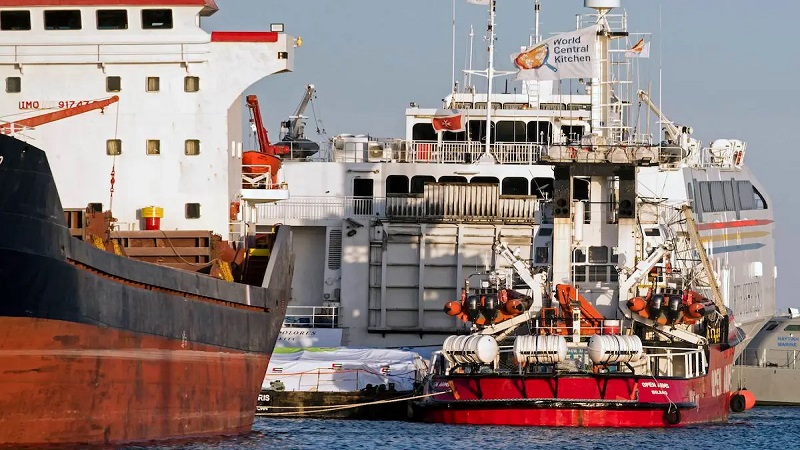A ship carrying 200 tonnes of aid for Gaza left Cyprus on Tuesday in a pilot project to open a sea route to deliver supplies to a population that aid agencies say is on the brink of famine, Reuters has reported. The charity ship Open Arms was seen sailing out of Larnaca port in Cyprus, towing a barge containing flour, rice and protein. The mission is being funded mostly by the UAE and organised by US-based charity World Central Kitchen (WCK).
The journey to Gaza takes about 15 hours but a heavy tow barge could make the trip considerably longer, possibly up to two days. Cyprus is just over 200 miles (320 km) north-west of Gaza.
The US military said that the USAV General Frank S. Besson is also en route to provide humanitarian relief to Gaza by sea. It is said to be carrying the necessary equipment to build a floating pier to aid the transit of aid from ship to shore in Gaza.
With aid agencies saying deliveries in Gaza have been held up by bureaucratic obstacles and insecurity since the start of Israel’s military offensive in October, and even Israel’s allies demanding easier aid access to the enclave, attention has shifted towards alternative routes including delivery by sea and airdrops.
Tuesday’s mission was the culmination of months of preparation by Cyprus, the EU member state closest to the Palestinian enclave. It is keeping a wary eye on spill over effects from upheaval in the Middle East and is already seeing migratory inflows from Lebanon increasing. More than 400 people arrived on the island in fishing boats on Monday.
With the lack of port infrastructure, WCK said it was building a landing jetty in Gaza with material from destroyed buildings and rubble. This is a separate initiative to the plan announced by US President Joe Biden last week to build a temporary pier in Gaza to facilitate aid deliveries by sea.
Construction of the jetty is “well underway,” said WCK founder Jose Andres on X. “We may fail, but the biggest failure will not be trying!” A picture of work with bulldozers apparently levelling out ground close to the sea accompanied his post.
Prior to October, about 500 trucks entered Gaza every day, with 100 of those carrying aid and the rest commercial supplies, such as fuel and cooking gas, according to UNRWA, the main UN aid agency in Gaza.
“This is when shops and markets were functioning. Currently, the whole of the Gaza population is almost entirely relying on humanitarian aid,” explained Juliette Touma, UNRWA director of communications. “No aid ships by sea were coming to Gaza. Trucks were coming via Karem Abu Salem by road.”
The UN estimates that a quarter of the population in the bombarded enclave is at risk of starvation, and aid is barely scratching the surface of daily needs. The international organisation has previously accused Israel of blocking aid deliveries to Gaza. Israel denies imposing any limits on aid and has blamed holdups on poor logistics by the UN and other aid agencies.
“The conditions on the ground and among the displaced are very dire, I have been touring the market since the morning and the prices are beyond the average people’s ability to afford,” said Yamen, a father of four, whose family took shelter in Deir Al-Balah in the central Gaza Strip. “We are being starved in two ways: food is scarce, and the little that is available is so expensive as to be beyond imagination.”
Israel’s offensive has displaced most of Gaza’s 2.3 million people, with many cramped into makeshift tents with little in the way of food or basic medical supplies in the southern city of Rafah.
There have been chaotic scenes and deadly incidents at aid distributions as desperately hungry people scramble for food.
On Tuesday, Palestinian health officials reported that nine Palestinians were killed and dozens wounded by Israeli soldiers when crowds were awaiting aid trucks at the Kuwait Square in Gaza City. There was no immediate comment from Israel on the incident.
In one incident last month, more than 100 Palestinians were killed while queuing for aid. Gaza health authorities blamed Israeli gunfire for the deaths; Israel denied this, and claimed that the victims had been trampled.
“Bombing gatherings of hungry people has become a daily routine practiced by the [Israelis] and seen by the international community on screens,” said Ashraf Al-Qidra, spokesperson for the Gaza health ministry on Tuesday. “Hunger will claim the lives of all residents in northern Gaza. Aid is very scarce. The price of a meal could mean certain death. Help the people of the north. Don’t leave them prey to hunger, bombing and disease.”
Source: Middle East Monitor









